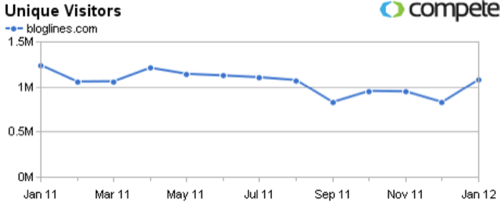One of the interesting trends of 2009 has been the gradual decline of RSS Readers as a way for people to keep up with news and niche topics. Many of us still use them, but less than we used to. I for one still maintain a Google Reader account, however I don’t check it on a daily basis. I check Twitter for news and information multiple times a day, I monitor Twitter lists, and I read a number of blogs across a set of topics of most interest to me.

Frankly I’m more likely to use Google Reader to search for specific information nowadays, than to scan my subscribed feeds for their latest posts. So what’s happened to RSS Readers. Do people still use them and is there still a viable market for them?
In February 2007 we reported on the state of the RSS Reader market, based on statistics from Feedburner and Pheedo. At that point Google had 59% market share amongst web-based RSS Readers, followed by Bloglines with 33%, then Newsgator and Netvibes with 3% (note: this didn’t count Newsgator’s desktop apps, like FeedDemon). Pheedo’s stats in February 2007 were somewhat different: Newsgator Online had 27% share, followed by MyYahoo! with 20%, Blogines 19% and Google Reader 13%.
The first time ReadWriteWeb looked into market share for RSS Readers was 5 years ago, in December 2004. At that point, very early in the web 2.0 era, Bloglines was the clear leader and Google Reader wasn’t even a glint in the milkman’s eye.
2009 Update on RSS Reader Market
Well, unfortunately Feedburner no longer publishes any useful data about RSS Readers. The product has been infrequently updated since Google acquired it in June 2007 and it no longer even has a proper blog (a Google blog called Adsense For Feeds was the closest I could find).
Pheedo also has gone quiet from a blogging perspective – its last blog post was January 2009. Tellingly though, it has an active Twitter account.
The best data we have then is ReadWriteWeb’s own Feedburner account. Here is the top 10 for Dec 09:
1. Google Feedfetcher 85665 (includes both Google Reader and its start page iGoogle)
2. Bloglines 38797
3. Netvibes 34894
4. FriendFeed 16269
5. NewsGator Online 6753
6. Firefox Live Bookmarks 2999
7. PostRank 2454
8. Windows RSS Platform 1587
9. Mac OS X RSS Reader 1307
10. Zhuaxia 1127 (a Chinese RSS Reader)
Feedburner’s numbers always need to be taken with a large grain of salt, nevertheless we can see that Google is now over twice the number of Bloglines. There’s little sign of life on Bloglines’ blog either and its Compete.com traffic numbers show a decline since June 2009.

Netvibes, FriendFeed, Newsgator and PostRank are the only other english language competitors showing in our Feedburner numbers. The others are either browser (Firefox) or operating system readers.
Also note that Newsgator shut down its online RSS Reader at the end of July this year.
Conclusion: Google Dominates, RSS Readers Less Relevant
These statistics are by no means the definitive RSS Reader market numbers. They do clearly show two things though:
1) Google now dominates what’s left of the RSS Reader market. Bloglines is hanging in there, but it seems like it’s given up the fight judging by lack of activity in its blog and traffic dips.
2) RSS reading is a very fragmented experience circa 2009. People can monitor news and information via Twitter, Facebook, start pages like Netvibes, their Firefox bookmarks, their OS, aggregators like Techmeme, and so on.
Tell us in the comments how you currently read your RSS feeds and how often you check them in an RSS Reader – if indeed you still use one…
Update: I should add that our news writers use a variety of RSS Readers daily.

















